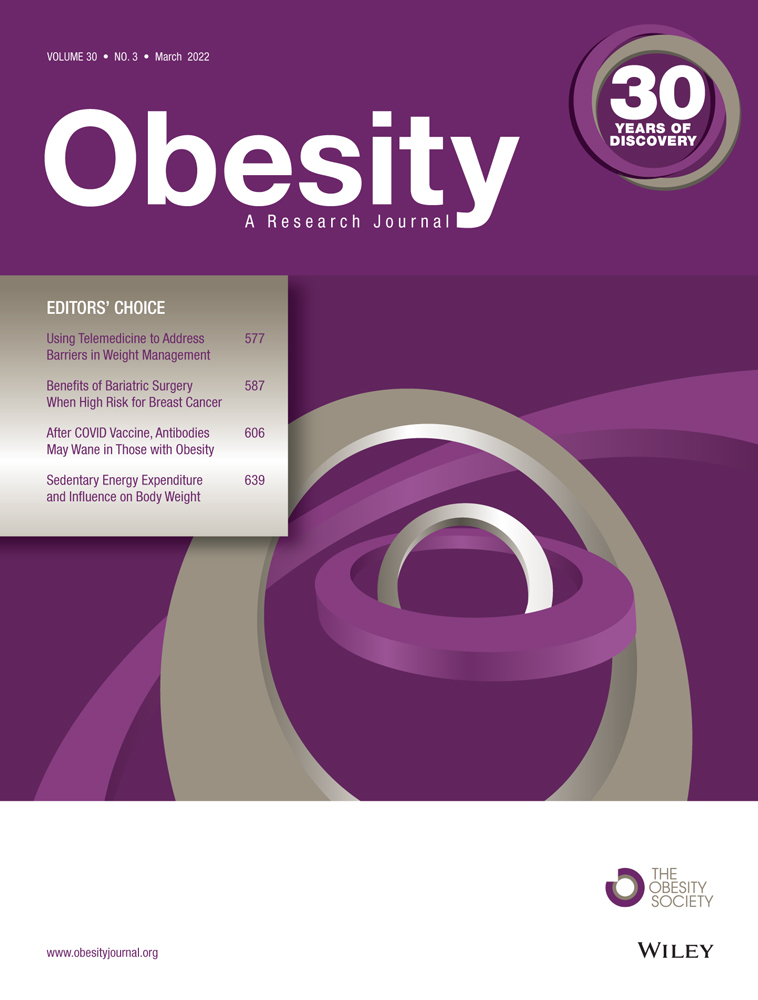History of bariatric surgery and COVID-19 outcomes in patients with type 2 diabetes: Results from the CORONADO study
François Pattou and Bertrand Cariou contributed equally to this work.
Funding information
This study received the following funding: the Fondation Francophone de Recherche sur le Diabète (FFRD), supported by Novo Nordisk, MSD, Abbott, AstraZeneca, Lilly, and FFD (Fédération Française des Diabétiques) – CORONADO initiative emergency grant; Société Francophone du Diabète (SFD) – CORONADO initiative emergency grant; Air Liquide Health Care international. CORONADO initiative emergency grant; Allergan, CORONADO initiative emergency grant; AstraZeneca, CORONADO initiative emergency grant; Elivie, CORONADO initiative emergency grant; Fortil, CORONADO initiative emergency grant; Lifescan, CORONADO initiative emergency grant; NHC, CORONADO initiative emergency grant; Nantes Métroplole, CORONADO initiative emergency grant; Novo Nordisk, CORONADO initiative emergency grant; Sanofi, CORONADO emergency grant; PHRC National COVID-19 Hospitalization and Care Organization Division (DHOS) as part of the Hospital Clinical Research Program (PHRC COVID-19-20-0138). All research facilities are acknowledged for providing research associates and research technicians for clinical investigations pro bono. The funders of the study had no role in study design, data collection, data analysis, data interpretation, or writing of the report.
Abstract
Objective
This study assessed the impact of a history of metabolic and bariatric surgery (MBS) on the clinical outcomes in patients with type 2 diabetes (T2D) and severe obesity hospitalized for COVID-19.
Methods
In this post hoc analysis from the nationwide observational CORONADO (Coronavirus SARS-CoV2 and Diabetes Outcomes) study, patients with T2D and a history of MBS were matched with patients without MBS for age, sex, and BMI either at the time of MBS or on admission for COVID-19. The composite primary outcome (CPO) combined invasive mechanical ventilation and/or death within 7 and 28 days following admission.
Results
Out of 2,398 CORONADO participants, 20 had a history of MBS. When matching for BMI at the time of MBS and after adjustment for diabetes duration, the CPO occurred less frequently within 7 days (3 vs. 17 events, OR: 0.15 [0.01 to 0.94], p = 0.03) and 28 days (3 vs. 19 events, OR: 0.11 [0.01 to 0.71], p = 0.02) in patients with MBS (n = 16) vs. controls (n = 44). There was no difference in CPO rate between patients with MBS and controls when matching for BMI on admission.
Conclusions
These data are reassuring regarding COVID-19 prognosis in patients with diabetes and a history of MBS compared with those without MBS.
CONFLICT OF INTEREST
EB-C reports grants, nonfinancial support, or personal fees from Fujirebio, NovaBiomedica, and Siemens Healthineers. LB reports grants, nonfinancial support, or personal fees from AstraZeneca, Becton Dickinson, BMS, Boehringer Ingelheim, Eli Lilly, Janssen, MSD, Novartis, Novo Nordisk, Pierre Fabre Santé, Roche, and Sanofi. SB reports grants, nonfinancial support, or personal fees from Abbott, Boehringer Ingelheim, Eli Lilly, Medtronic, Medtrum, Novartis, and Novo Nordisk. CC reports grants, nonfinancial support, or personal fees from Eli Lilly, Novo Nordisk, and Sanofi. MP reports grants, nonfinancial support, or personal fees from Air Liquid, Allergan, Amgen, Elivie, Fortil, Lifescan, NHC, Novo Nordisk, and Sanofi. MW reports personal fees from Novo Nordisk. SH reports grants, nonfinancial support, or personal fees from Air Liquid, Allergan, AstraZeneca, Bayer, Boehringer Ingelheim, Dinno Santé, Eli Lilly, Elivie, Fortil, Lifescan, LVL, Merck Sharpe Dome, NHC, Novartis, Pierre Fabre Santé, Sanofi, Servier, and Valbiotis. PG reports grants or personal fees from Abbott, Air Liquid, Allergan, Amgen, AstraZeneca, Boehringer Ingelheim, Eli Lilly, Lifescan, Merck Sharp and Dohme, Mundipharma, Novo Nordisk, Sanofi, and Servier. BC reports grants, nonfinancial support, or personal fees from Abbott, Amgen, Akcea AstraZeneca, Pierre Fabre, Genfit, Gilead, Eli Lilly, Merck Sharpe Dome, Novo Nordisk, Regeneron, and Sanofi. The other authors declared no conflict of interest.





